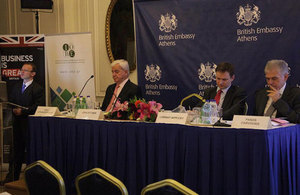'Reaching our Potential: Competitiveness in the EU' - Greece
The seminar was organised by the British Embassy, in partnership with the Foundation for Economic & Industrial Research (IOBE).

The British Embassy, in partnership with the Foundation for Economic & Industrial Research (IOBE), held a seminar today entitled ‘Reaching our Potential: Competitiveness in the EU’.
Academics, business representatives and economic commentators led 3 panel discussions on topics including the creation of a digital economy, completing the single market, better regulation and trade at the EU level. The British Ambassador John Kittmer opened the event alongside Chairman of the Board of Directors of IOBE, Takis Athanassopoulos, Europe Director at the Foreign and Commonwealth Office, Lindsay Appleby and the Director of the Representation of the European Commission, Panos Carvounis.
The purpose of the seminar was to stimulate a discussion amongst British and Greek experts on growth and competitiveness challenges and opportunities in the context of both Greece and the UK, as well as the wider EU. The discussion picked up on issues outlined by British Prime Minister David Cameron in his letter to the President of the European Council Donald Tusk in November 2015. In the letter, Mr Cameron outlined the four areas where UK is seeking reforms as part of negotiations on the country’s membership of the European Union. These four key areas are, in broad terms, economic governance, competitiveness, sovereignty and welfare.
People across Europe want a European Union that can generate growth and jobs. The UK has always been a champion of making Europe more competitive and would like to see a target to cut the total regulatory burden on businesses. The UK wants the EU to become a source for jobs, growth and innovation, through completion of the single market and signature of external trade deals. The reforms the UK is pursuing will be beneficial to the whole of the EU, including Greece.
In his opening speech the British Ambassador said:
Today’s seminar is a chance to explore where the remaining competitiveness challenges, and barriers to business, still lie at national and EU levels. In doing this, we can identify and exploit opportunities to boost growth and competitiveness, in order to secure the EU’s future legitimacy across its Member States and beyond.’
In a reference to the Greek economy, the Chairman of the IOBE BoD, Mr. Takis Athanassopoulos remarked: >We have not been doing enough to prosper over the medium and long term because all the efforts so far to organize and rehabilitate our national economy were ineffective as they haven’t addressed its structural problems. Simply said, the major problem of Greek society is its governance structure and the way of interaction between its key pillars. The Europe Director at Foreign and Commonwealth Office Lindsay Appleby added:
We’d all agree that membership of the EU has allowed us to be greater than the sum of our parts… But the EU faces fundamental challenges and the needs and expectations of its citizens are evolving… Whilst progress has already been made towards creating a more competitive Europe, we need to go further and faster to achieve irreversible change.’
During his introduction to the panel discussion, the Director General of IOBE, Professor Nikos Vettas noted:
There are some interesting parallels between key developments in the EU and Greece, as both have failed to implement the needed reforms during the times of high growth and are now forced to act urgently and within a much more challenging economic and political environment. The lack of a clear and credible direction for economic policy, and of a vision for how Europe and Greece can or should be in a decade, creates high uncertainty and in turn discourages investment in physical and human capital.
The event also included speeches by: Theodore Fessas, Chairman of the Board of Directors of Hellenic Federation of Enterprises, Christos Gortsos, Secretary General of the Hellenic Bank Association, Socrates Lazaridis, CEO of Athens Exchange Group, Jeroen Commissaris, President and Managing Director of AstraZeneca Greece, Allie Renison, Head of Europe and Trade Policy at UK Institute of Directors, Elias Papaioannou, London Business School and Panos Tsakloglou, Athens University of Economics and Business.
The discussion was moderated by Antonis Papagiannidis (Business Files) and Tassos Telloglou (Star TV and Kathimerini newspaper).
Photos from the seminar here.
Notes for Editors:
-
On 10 November 2015, PM Cameron delivered his speech on Europe at Chatham House, setting out the case for EU reform and set out the four key ways he wants to change the UK’s membership of the EU in a letter to European Council President Donald Tusk.
-
The PM has set out the four objectives at the heart of UK’s renegotiations: economic governance, competitiveness, sovereignty and migration/welfare. On economic governance, UK wants to protect the single market for Britain and others outside the Euro. On competitiveness, UK wants to write this into the DNA of the whole EU. On sovereignty, it wants Britain exempted from an ‘ever closer union’ and to bolster national parliaments. On migration, UK wants to tackle abuses of the right to free movement.
-
The UK is set to have a referendum by the end of 2017 on whether or not to remain a member of the European Union.
-
Delivering on the Prime Minister’s commitment to give the British people a very simple choice on the UK’s membership of the EU, the EU Referendum Bill was introduced into Parliament on 28 May 2015. Contained within the Bill is the question that will be put to the electorate, as well as []making clear the franchise for the referendum. Voters will be asked: ‘Should the United Kingdom remain a member of the European Union?’
-
Read about the UK’s policy initiative of reducing regulation on businesses and making it easier to set up and grow your business.
Updates to this page
-
Added translation
-
link
-
Added translation
-
Added translation
-
First published.